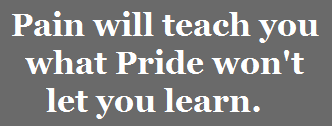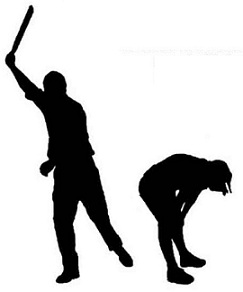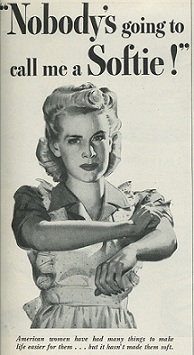Strong Meat if you're up for it
Forget the Milk of Human Kindness.
Strong Meat WORKS!
Once you grow up, and haven't learned the elementary lessons.
 Amy Chua created a firestorm of controversy with her powerful book, Battle Hymn of the Tiger Mom. Do Asian mothers have a better handle on how to raise children with a deep sense of personal responsibility. American parents know they WANT their children to have an internal motivator, an inner Work Ethic, but how do we teach it to our kids. Amy Chua's view is one that Americans used to believe in -- that children actually want to strive to be their best. They want their parents and teachers and coaches to inspire them to excel and to achieve. Americans seem to have settled for lazy kids and lazier parents. So when Amy Chua comes along and shocks them with the clear implication that "excellence is better than lazy" -- Americans feel offended. Are Chinese parenting methods superior?
Amy Chua created a firestorm of controversy with her powerful book, Battle Hymn of the Tiger Mom. Do Asian mothers have a better handle on how to raise children with a deep sense of personal responsibility. American parents know they WANT their children to have an internal motivator, an inner Work Ethic, but how do we teach it to our kids. Amy Chua's view is one that Americans used to believe in -- that children actually want to strive to be their best. They want their parents and teachers and coaches to inspire them to excel and to achieve. Americans seem to have settled for lazy kids and lazier parents. So when Amy Chua comes along and shocks them with the clear implication that "excellence is better than lazy" -- Americans feel offended. Are Chinese parenting methods superior?
The Christian Bible tells us (Hebrews 12:11) that "All chastisement for the present seemeth not to bring joy, but sorrow: but afterwards it will yield, to them that are exercised by it, the most peaceable fruit of righteousness." And is not this true? Who has not had a coach or teacher or parent who demanded our best, and afterward we were glad they did. Who has not had a doctor who inspired us by confronting us with needed change in our habits or lifestyle?
The West has had three hundred years of more and ever-more enlightened theories. Child-rearing has gotten more and more liberal, and less and less accountable -- leading to what conservatives have called the dumbing down of America. William F. Buckley used to ask: where is the ideal of intellectual excellence? Where is the ideal of intelligence and pride in scholarship? Are we becoming mentally lazy? More recent conservatives such as Allan Bloom (Closing of the American Mind) and Thomas Sowell have continued the criticism of moral and intellectual laziness -- and the call for lofty standards.
 It is said that the entire point of discipline is self-discipline. the whole point of being inspired from without, is to attain a motivation from within. And the implication is clear. Those who inspire you from without are thus not your enemies, but potentially your best friends. Is not this one of the best things about a family, or the human tribe? We have one another to coax, or correct, or motivate, or inspire. "Lean on me, when you're not strong, And I'll be your friend. I'll help you carry on."
It is said that the entire point of discipline is self-discipline. the whole point of being inspired from without, is to attain a motivation from within. And the implication is clear. Those who inspire you from without are thus not your enemies, but potentially your best friends. Is not this one of the best things about a family, or the human tribe? We have one another to coax, or correct, or motivate, or inspire. "Lean on me, when you're not strong, And I'll be your friend. I'll help you carry on."
Not to flatter, but to encourage (if that's what we need), or to give us the straight dope we might be avoiding. Isn't that really the point of childhood? Preparation for life among other people? And learning to "internalize" the lessons that once came from the outside, and in adulthood must come from within. It's a lesson for adults, and certainly a lesson for kids.
Sometimes we need someone to keep us accountable.
It is easy to be the one who always says YES. It's not so easy being the one who teaches what NO means. When I was growing up, it often fell to mothers to do the dirty work of saying "NO." A very great man, Robert E. Lee, told his wife he much preferred to use Love rather than Fear as the source of discipline or motivation. Absolutely, we say. Who would not like to be the "good guy" and only use love, not fear or confrontation. "Catch them being good" the best motivators teach us. Reward the positive behavior and ignore the unseemly actions or behavior.
But sometimes, life is not so neat and clean. There is an anomaly, or is it a paradox -- sometimes pain will teach you what pride won't let you learn.

Pain will teach you
what Pride won't let you learn
Tough Love
 In our infancy, we are surrounded with nurture and comfort. Our caregiver (mother) pampers us with food, cleans us and showers us with affection and warmth. We eat and sleep and do little more, and Mother (or Daddy) is there to respond to us socially, our earliest beginnings of acculturation. But later, we are gradually weaned from these primary indulgences so necessary for our healthy start. We gradually graduate to a more advanced level of training. It is not a demotion to have more expected of us, but a promotion. It is not a demotion to evolve beyond the milk of human kindness to the strong meat of higher expectations, but a promotion.
In our infancy, we are surrounded with nurture and comfort. Our caregiver (mother) pampers us with food, cleans us and showers us with affection and warmth. We eat and sleep and do little more, and Mother (or Daddy) is there to respond to us socially, our earliest beginnings of acculturation. But later, we are gradually weaned from these primary indulgences so necessary for our healthy start. We gradually graduate to a more advanced level of training. It is not a demotion to have more expected of us, but a promotion. It is not a demotion to evolve beyond the milk of human kindness to the strong meat of higher expectations, but a promotion.
These days the horror stories of Cult abuse and litigious ex-Christians (sue happy victims "biting the hand that fed them"? how do I know, I wasn't there!) fill the news and brands our minds with an image of cruel and tyrannical authority figures. The reality is, not all exercise of authority is medieval oppression. Nor in fact, was all medieval exercise of authority cruel or tyrannical. We pride ourselves on our enlightened modern attitudes, but that modernity and enlightenment are in a real sense the fruit of preparation that came from our medieval past. See our accusation culture.
I grew up in a time when so-called biblical methods of correction and training were common in homes, and not unheard of in schools and incarcerative settings. It was certainly not considered shocking to hear of some delinquent, even an older one, getting his backside blistered for defiance and vulgarity and disrespect. There were known standards, and a "punk" who
deliberately or chronically persisted in crossing them was virtually writing his own fate. Tough Love was not really regarded as abuse, though of course it could be. "Envy not the oppressor," the Bible tells us. But these days almost all authority is depicted as Taliban or Sharia sort of oppression. See Shocking ideas for sentencing reform
And the image just is not fair (and perhaps much of the Taliban bad press is unfair, too.) It is overboard. A caricature. Not all authority is unadulterated evil, or we might as well abolish all government, all religion, and parenthood, too. Tough love has its place, along with every sort of motivation, accountability, and encouragement. See is Taliban stereotype unfair?.
Say NO once in a while
 We might ask why it is that some "Tough Love" programs have such high positive outcomes, when results are counted. A big part obviously has to be balancing of firmness with positive reinforcements. A pat on the back given in warm encouragement has to be as effective as running laps for incentive. If carrot and stick are part of the same package, the motivator or "physical trainer" surely has to be judicious in his approach.
We might ask why it is that some "Tough Love" programs have such high positive outcomes, when results are counted. A big part obviously has to be balancing of firmness with positive reinforcements. A pat on the back given in warm encouragement has to be as effective as running laps for incentive. If carrot and stick are part of the same package, the motivator or "physical trainer" surely has to be judicious in his approach.
But negative feedback for conditioning is surely only part of what lies at the heart of discipline. A part must also be an aspect of genuine inner therapy, or transformation. We go through something difficult and it is more than just "dont touch a hot stove." there is also something almost life-changing out of an oceanic experience, even a so called negative one. Martin Luther King talked aout the redemptive power of suffering. God is still able to bring good out of evil.
Occasionally we hear of prisoners of war who experienced unspeakable tortures only to confess later that "God" was with them at the heights of their torment. They felt a cleansing or expiation at the very moment they thought they would die from their agonies. Saint John of the Cross, the Spanish mystic, was such a prisoner of war (not war, per se, but the inquisition he wound up victim to). See A barefoot reformer kidnapped and tortured.
Indeed, Christian mysticism delves into the phenomenon of "joy in suffering" rather frequently. We learn of the salvific meaning of suffering: Salvifici Doloris. Saint Paul speaks of joy in suffering in Colossians: "I rejoice in my sufferings for your sake". He had found a source of joy in overcoming the sense of the uselessness of suffering. Faith in sharing in the suffering of Christ brings with it the interior certainty that the suffering person "completes what is lacking in Christ's afflictions"; the certainty that in the spiritual dimension of the work of Redemption he is serving, like Christ, the salvation of his brothers and sisters. See Suffering for Christ's Sake.
Saint Paul states that it is suffering, more than anything else, which clears the way for the grace which transforms human souls. Suffering, more than anything else, makes present in the history of humanity the powers of the Redemption.
But beware of the counterfeit. When freaks pervert it, they create something depraved, and pornographic
Cultural Differences
Every historian knows the dangers of over-simplification, but every historian inevitably over-simplifies from time to time. And the reason is that we extract principles or "rules." from what would otherwise overwhelm us (information overload).
I want to point out the cultural differences in America on the child-rearing issue. Whites for years have had better education, more affluence, more privilege,and their child rearing has gotten more liberal, more enlightened, softer and softer. Blacks have suffered more poverty, more hardship, more discrimination, and with less opportunities with which to cope. Yet these days we marvel at their resilience. Perhaps they turned inward for values, and for inner strength.
See Keep us forever in the path, we pray
And it would appear that with God on their side, they have done better with less. They have more robust family values, it would appear, and turn out better kids --- than the spoiled and pampered white "elites" have. How many times in history have we seen this. God gives grace to the lowly, but the rich he sends empty away. See The renewal came from below
In modern America, it is possible that new age parenting -- may work on girls. But boys apparently need something stronger. And the black families, (generalizing greatly) have been able to do this. White men, looking at almost every score-card of evaluation, have declined rather pathetically since the greatest generation. The hippies onward. Smarter, yes, and richer, yes, but in terms of character -- they lag disastrously behind minorities everywhere. Please don't be offended, but do your own research. do your own mental experiment and see if this is true. See Slouching toward decadence.
The irony, is that in pioneer America, whites had just as solid family structures, and close-knit kinship units, as the black families, and "Black Church" milieu these days. And they turned out better MEN, too. Obviously there are dangers to over-simplifying, and the reader can spot exceptions to the "rule" -- as it were. But my point remains, I believe.
Let's learn from what works.
 Amy Chua created a firestorm of controversy with her powerful book, Battle Hymn of the Tiger Mom. Do Asian mothers have a better handle on how to raise children with a deep sense of personal responsibility. American parents know they WANT their children to have an internal motivator, an inner Work Ethic, but how do we teach it to our kids. Amy Chua's view is one that Americans used to believe in -- that children actually want to strive to be their best. They want their parents and teachers and coaches to inspire them to excel and to achieve. Americans seem to have settled for lazy kids and lazier parents. So when Amy Chua comes along and shocks them with the clear implication that "excellence is better than lazy" -- Americans feel offended. Are Chinese parenting methods superior?
Amy Chua created a firestorm of controversy with her powerful book, Battle Hymn of the Tiger Mom. Do Asian mothers have a better handle on how to raise children with a deep sense of personal responsibility. American parents know they WANT their children to have an internal motivator, an inner Work Ethic, but how do we teach it to our kids. Amy Chua's view is one that Americans used to believe in -- that children actually want to strive to be their best. They want their parents and teachers and coaches to inspire them to excel and to achieve. Americans seem to have settled for lazy kids and lazier parents. So when Amy Chua comes along and shocks them with the clear implication that "excellence is better than lazy" -- Americans feel offended. Are Chinese parenting methods superior?
 It is said that the entire point of discipline is self-discipline. the whole point of being inspired from without, is to attain a motivation from within. And the implication is clear. Those who inspire you from without are thus not your enemies, but potentially your best friends. Is not this one of the best things about a family, or the human tribe? We have one another to coax, or correct, or motivate, or inspire. "Lean on me, when you're not strong, And I'll be your friend. I'll help you carry on."
It is said that the entire point of discipline is self-discipline. the whole point of being inspired from without, is to attain a motivation from within. And the implication is clear. Those who inspire you from without are thus not your enemies, but potentially your best friends. Is not this one of the best things about a family, or the human tribe? We have one another to coax, or correct, or motivate, or inspire. "Lean on me, when you're not strong, And I'll be your friend. I'll help you carry on."

 In our infancy, we are surrounded with nurture and comfort. Our caregiver (mother) pampers us with food, cleans us and showers us with affection and warmth. We eat and sleep and do little more, and Mother (or Daddy) is there to respond to us socially, our earliest beginnings of acculturation. But later, we are gradually weaned from these primary indulgences so necessary for our healthy start. We gradually graduate to a more advanced level of training. It is not a demotion to have more expected of us, but a promotion. It is not a demotion to evolve beyond the milk of human kindness to the strong meat of higher expectations, but a promotion.
In our infancy, we are surrounded with nurture and comfort. Our caregiver (mother) pampers us with food, cleans us and showers us with affection and warmth. We eat and sleep and do little more, and Mother (or Daddy) is there to respond to us socially, our earliest beginnings of acculturation. But later, we are gradually weaned from these primary indulgences so necessary for our healthy start. We gradually graduate to a more advanced level of training. It is not a demotion to have more expected of us, but a promotion. It is not a demotion to evolve beyond the milk of human kindness to the strong meat of higher expectations, but a promotion.
 We might ask why it is that some "Tough Love" programs have such high positive outcomes, when results are counted. A big part obviously has to be balancing of firmness with positive reinforcements. A pat on the back given in warm encouragement has to be as effective as running laps for incentive. If carrot and stick are part of the same package, the motivator or "physical trainer" surely has to be judicious in his approach.
We might ask why it is that some "Tough Love" programs have such high positive outcomes, when results are counted. A big part obviously has to be balancing of firmness with positive reinforcements. A pat on the back given in warm encouragement has to be as effective as running laps for incentive. If carrot and stick are part of the same package, the motivator or "physical trainer" surely has to be judicious in his approach.
